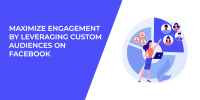Facebook Ads have become a cornerstone of digital marketing, offering businesses a powerful platform to reach potential customers. One of the key aspects of running effective Facebook Ads campaigns is understanding the cost per click (CPC) – how much you should be paying for each click on your ads. CPC can significantly influence your budget, ROI, and overall ad performance.
In this article, we’ll explore how much you should expect to pay per click on Facebook, the factors that influence CPC, and how to optimize your ads for cost-efficiency.
What is Cost Per Click (CPC)?
Cost per click (CPC) is the price you pay each time a user clicks on your Facebook ad. This is a commonly used pricing model for Facebook Ads, especially when the goal is to drive traffic to a website or landing page. CPC is influenced by various factors such as your ad’s relevance, targeting, and the competition in your industry.
Understanding CPC is essential for budgeting and optimizing your Facebook ad campaigns. If you can manage your CPC effectively, you can drive high-quality traffic to your site without exceeding your advertising budget.
What is the Average CPC for Facebook Ads?
The cost of Facebook ads can vary significantly based on multiple factors such as your industry, target audience, and ad placement. However, on average, the CPC for Facebook Ads typically ranges between $0.50 and $2.00 USD. For more competitive industries, it could rise to $3.00 or higher, especially if you're targeting a highly competitive demographic.
Statistic: According to a 2023 report, the average CPC for Facebook Ads across various industries is around $1.72 USD. However, businesses in industries such as e-commerce and finance often experience higher CPCs due to intense competition.
Factors That Influence CPC on Facebook Ads
Several factors contribute to the variability in CPC, and understanding them can help you control your costs and optimize your campaigns. Here are the main factors that impact CPC:
-
Ad Relevance:
Facebook rewards ads that are highly relevant to their target audience. If your ad is deemed relevant by Facebook’s algorithm (based on user interaction), you may experience lower CPC because Facebook wants to deliver ads that users engage with. -
Targeting:
The more specific your audience targeting, the more you may have to pay. Narrower targeting means less competition, but it could also mean higher bids for that smaller group. Broad targeting, on the other hand, might lower your CPC, but you may get less qualified clicks. -
Ad Quality:
Higher-quality ads tend to attract more clicks, which can result in a lower CPC. Ads with engaging visuals, clear messages, and strong CTAs (calls to action) often perform better, improving their relevance score. -
Industry and Competition:
The industry you are advertising in has a huge impact on CPC. Industries like finance, real estate, and legal services tend to have higher CPCs due to strong competition and high customer value. On the other hand, less competitive sectors may have lower CPCs. -
Time of Year:
CPC can fluctuate throughout the year based on demand. For example, around holidays or key sales periods, the competition for ad space increases, and CPC may rise. -
Bid Strategy:
Facebook Ads allow you to set either a manual or automatic bid for CPC. In the case of automatic bidding, Facebook will optimize your bids to get you the most clicks within your budget. With manual bidding, you set the maximum CPC you are willing to pay.
How to Optimize CPC for Facebook Ads
While you can’t control all the factors that influence CPC, you can take steps to optimize your campaigns and reduce costs. Here are some strategies:
-
Refine Audience Targeting:
Narrowing down your audience to those who are most likely to convert can reduce CPC. Facebook’s audience targeting tools, like Lookalike Audiences, allow you to reach people similar to your best customers, potentially lowering your CPC. -
Improve Ad Relevance and Quality:
Focus on creating ads that resonate with your audience. Use high-quality images or videos, compelling ad copy, and clear CTAs. The more engaging and relevant your ad is, the more likely it is to lower your CPC by boosting your ad’s performance. -
Use Retargeting:
Retargeting ads often result in lower CPC because you're reaching people who have already shown interest in your products or services. You can use Facebook Pixel to track website visitors and retarget them with personalized ads. -
Test and Optimize Ads (A/B Testing):
Running A/B tests allows you to test different versions of your ad (copy, images, headlines, CTAs) to see which performs best. By continually optimizing your ads based on A/B testing, you can improve click-through rates (CTR) and reduce CPC over time. -
Leverage the Facebook Pixel:
The Facebook Pixel helps you track user behavior on your website and retarget users who have already engaged with your brand. This can improve ad relevance and lower CPC since you're targeting people who have already shown interest in your business. -
Set a Realistic Budget:
Ensure that your budget aligns with your campaign goals. If you set too low of a budget, Facebook may not have enough room to optimize your ad delivery, which can result in higher CPC. A higher budget allows Facebook to run your ad more effectively and reduce CPC over time.
Conclusion
The amount you pay per click on Facebook can vary widely depending on several factors, including your industry, targeting, and ad quality. On average, you can expect to pay between $0.50 and $2.00 per click. By understanding the factors that influence CPC and taking proactive steps to optimize your campaigns, you can reduce your ad costs and achieve a better return on investment.

